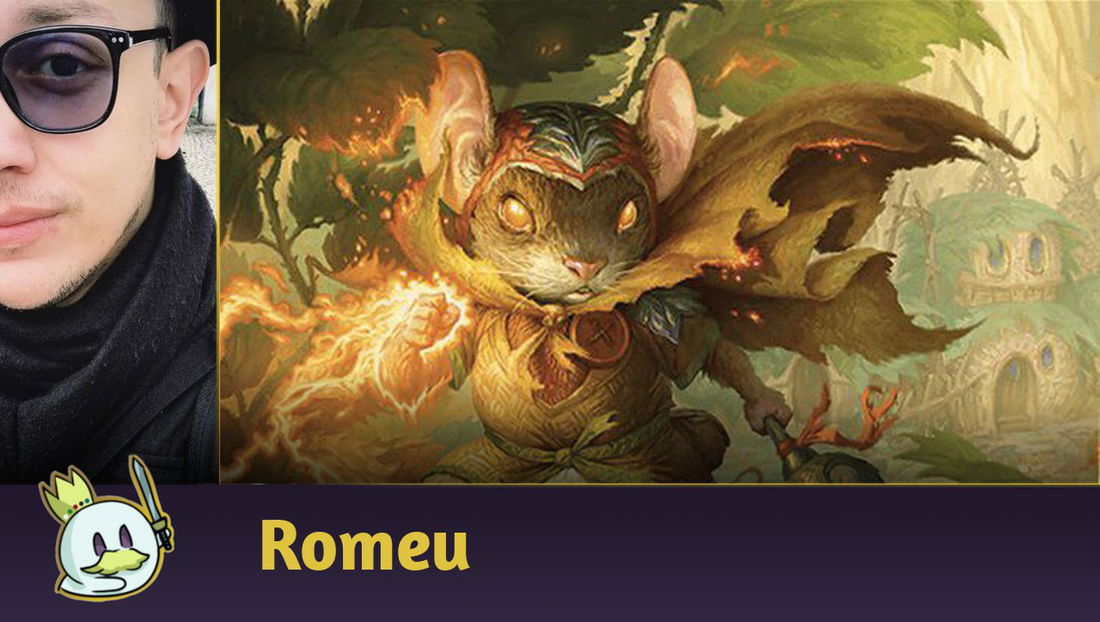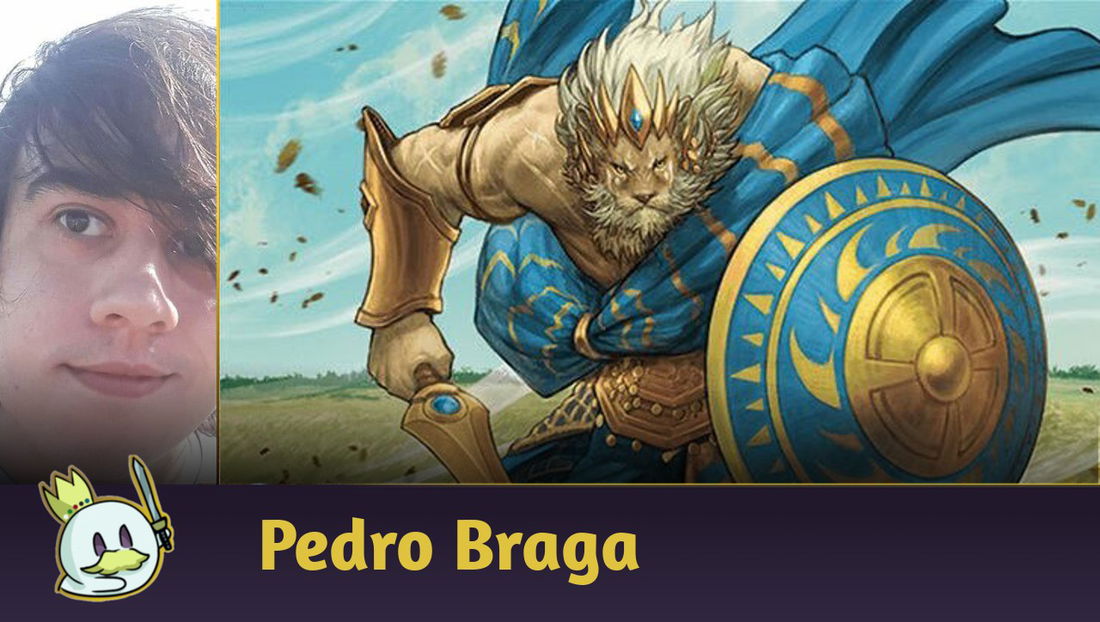It was the last week of October 2016, and Peregrine Drake was about to be banned. Several Pauper players gathered at a famous store in the Liberdade neighborhood of São Paulo to compete in the National Championship. That year, I had moved to the city and was taking a break from Magic, but I occasionally visited the stores to get to know the environments - on one of those trips, I not only bought a Mono Black Devotion deck but also participated in a qualifier, winning a tournament that I had no intention of winning.
Ad
Then, I was in the Nationals. The first round was about to begin. In front of me, a calm and enthusiastic man greeted me. “Good luck!” - we said to each other. Luck was something that, on the first turn, I discovered I would need a lot of: he was playing Burn, I was playing Mono Black Monarch, it was impossible to win that match without tons of luck.
My turn 4 of Game 1 was to cast Thorn of the Black Rose and take the Monarch token from my deckbox. At the time, Monarch had not yet arrived at Magic Online and was a mechanic exclusive to paper (the National adopted the MTGO legality only in 2017), but it was a tech already known in some regions of São Paulo - the opponent took the card to read, then took the token to read, and I tried to explain the mechanic as simple as I could: “It's like a Phyrexian Arena that works at the end of the turn, if you deal combat damage to me, you gain control of it”, to which he replied “Cool!”.
As expected, that enthusiastic guy beat me 2-0. As I signed the slip, his name stuck in my head: Alexandre Weber. He stood up, we wished each other good luck, I swallowed my frustration at getting the worst possible match in the first round and continued my participation. A day later, I found out on Facebook that Alexandre had been crowned national champion in that tournament.
Eight years have passed since that day. In one of the groups I participate in, someone said early in the afternoon: “Weber won the National Championship again!” Yes, again, because this wasn’t the second time – since that fateful encounter in the first round of what would be his first national title, Alexandre Weber has already taken the trophy home four times: in 2016, 2017, 2018 and now in 2024.
Weber started playing Magic at the age of seven, playing with friends and then moved on to competitive Yu-Gi-Oh!, returning to Magic only in 2015, where he bet on Pauper because it was the only format where he could have a deck.
Today, he is not only a four-time Brazilian champion and one of the best and most influential Pauper players in Brazil and the world, but he is also a member of the Pauper Format Panel, a committee that collaborates with Wizards of the Coast to regulate the Pauper Metagame and the most important initiative in the format’s recent history. Alexandre is also a content creator on his YouTube channel.
This week, I was able to meet with him again to talk about Pauper, the Metagame, and his perspective on what the ideal format would be, as well as discuss the Pauper Format Panel and the future of the format.

Being a four-time national champion certainly creates a reputation. After all, what is your training and preparation routine like for Nationals and other major Magic events that you participate in?
This year, I was more focused on creating content, so I wasn't able to train as much. But the part of thinking about the tournament's Metagame needs to be very intense, to be able to come up with a list in which all 75 cards will be very well-used.
Ad
Your deck choice for the 2024 Brazilian Pauper Nationals was Grixis Affinity. Since the inclusion of Bridges in Modern Horizons II, this is an archetype that has presented several controversies in the Pauper Metagame. How do you see Affinity's position in the format today?
For me, it's the best deck in Pauper, and this was renewed with the release of Modern Horizons 3, which came with Refurbished Familiar and solved several of the deck's problems with its evasion, color and effect, in addition to helping with affinity
This year's Pauper Nationals had 271 players, being one of - if not the largest - Pauper event that has ever taken place in Brazil. It's a sign of the format's notable growth here, while Magic continues to be an increasingly elitist hobby in the country. Considering this, do you believe that the future of Magic in Brazil lies in Pauper?
Yes, I do. I would like to see more accessible formats. I really like the existence of Commander 500 (a local budget version of Commander where decks can't cost more than R$ 500), for example, and I think that Pauper being the cheapest sanctioned and competitive format brings a very promising future that is increasingly becoming a reality, even if it is not a format that is part of the professional circuit.
The Brazilian Metagame has always had its peculiarities compared to the Magic Online or European scenarios. For example, Mono Black was a deck that lasted for many years in Brazil, despite the changes in the format. What differences are there today in the Brazilian competitive scene when we talk about decks compared to MTGO?
I think this Nationals reflected the Magic Online meta quite well, the quantities were very similar, in general. Pauperggedon was even more different from Magic Online, but the national one was a very similar representation of Magic Online and the percentages that each deck has there.
You are a member of the Pauper Format Panel and the representative of Latin America on the committee. Today, we can say that Pauper has a better response timing to very unbalanced scenarios than before the PFP, but there are claims on the social media that you take too long to take any action. How frequent are the conversations about Pauper's health among the Panel members?
The conversations are daily, but they intensify when the community's feedback is greater due to a certain demand for bans.

When we look at the representation numbers in the Metagame over the last three months, we notice a hegemony of the best decks alternating between three archetypes: Grixis Affinity, Broodscale Combo and Kuldotha Red. Followed by them, we have Gruul Ramp, Madness Burn and Mono Blue Terror. There are voices that consider Pauper today as broken and at risk of being banned, while others assess that the change lies in what the pillars of the format are. How do you see the state of Pauper today?
Ad
I think there are some problems. Pauper currently has these five main decks (except for Rakdos) and, despite there being a good number of stronger decks, they can represent a massive barrier for other archetypes in the Metagame. And among these five decks, there are some cards and ways of playing that can be problematic in some aspects, so this needs to be taken into account, despite there being this balance between the decks and even with other decks besides these appearing in the Metagame.
What defines, for you, whether a format is healthy or broken? What would the ideal Pauper be like for Alexandre Weber?
I think there are several metrics for a healthy or broken format: number of decks with a chance of doing well, the way the games develop, the win rate of the main decks and how many people are playing with the main decks, in addition to the time that the games usually take place, which preferably should not be too fast or too long. But for me, the Meta could always be healthier and for that to happen, in my view, it would only happen with a conscious effort to make cards for Tier 2 and 3 decks, to always have more decks entering the equation. But what usually happens is that when a strong card is released, this card usually already has a home, which is usually a deck that is already well-established in the format, which becomes even stronger, which is something that has happened a lot in the last two years with cards going to reinforce already good decks, like Affinity and Mono Red.
What does Pauper need to start expanding to the point of having events like the National and Paupergeddon in other regions of the world where the format is not yet as well-received as in Brazil?
I think it's just a matter of time, there are already big tournaments in other places like the United Kingdom and Poland. At MagicCon Vegas, there was also a Pauper tournament that had around 100 people. I think it's a growing trend in other countries as well, even due to the economic issues that the countries are going through, and that will become increasingly more intense.
Is there a possibility of Alexandre Weber participating in Paupergeddon in the future? And the possibility of other PFP members following the Brazilian Nationals?
The possibility always exists, but it's an expensive trip to make, and I have other priorities at this point in my life. There's also the possibility of people from abroad coming to play in the Brazilian Nationals, but in that case, it would be important for the organization to be able to offer spots in the national championship, by invitation, to people who live outside of Brazil.
What message do you consider important to leave for the Pauper community at the end of 2024? Both as Alexandre Weber, the four-time National Champion, and as a member of the Pauper Format Panel and representative of Latin America on the committee?
That the community is something very important, we are not alone in the world and there are many people who want to play the format, to have fun, improve, challenge themselves, and they need to be welcomed, more and more. I think the community does this in a certain way, but we can always do more and better.
Ad
On behalf of the Cards Realm team, I would like to thank Alexandre Weber for granting us this interview. You can find Alexandre Weber on his Twitter account (@webermtg) and also on his YouTube channel.
Thanks for reading!








— Comentarios0
Se el primero en comentar